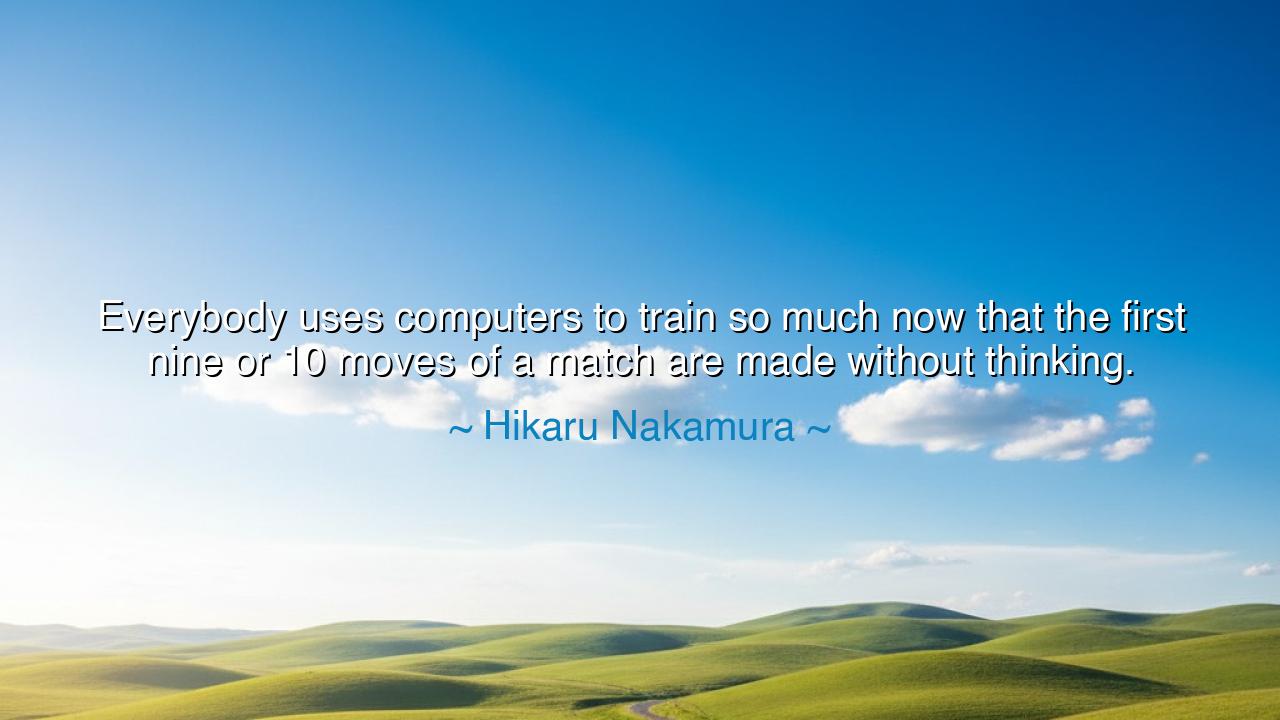
Everybody uses computers to train so much now that the first nine
Everybody uses computers to train so much now that the first nine or 10 moves of a match are made without thinking.






In the great unfolding of human progress, where the tools of the mind are sharpened and honed, there emerges a powerful truth in the words of Hikaru Nakamura, the grandmaster of chess: “Everybody uses computers to train so much now that the first nine or 10 moves of a match are made without thinking.” These words, spoken in the context of modern training, reveal a deep insight into the relationship between human intuition and technology. For Nakamura, the quote speaks to a world where, in the rush of innovation, the mind has become reliant on the external tools it has created—tools that often do the thinking for us before we even engage.
In the ancient world, there was a time when the warrior or philosopher was expected to rely solely on their own intellect and intuition. The great Greek tactician, Alexander the Great, when embarking on his campaigns, did not have the advantage of computers or modern technology to guide his military strategies. He relied on his own wisdom, the counsel of his generals, and the ancient art of warfare passed down through the ages. In those days, every move on the battlefield, every strategy used, required careful consideration and was often formed in the heat of the moment. Similarly, the philosophers of antiquity, like Socrates and Plato, relied on their intellectual prowess, questioning and debating in real-time, without the aid of external systems or tools to help them form their arguments. Their intuition, their ability to reason and adapt, was their guiding force.
Yet, the world has changed, and with the rise of technology, machines have increasingly become our partners in intellectual endeavor. Computers, in particular, have become central in training for complex tasks like chess—where every move can have far-reaching consequences. What Nakamura reveals in his quote is not merely a statement on modern chess, but a reflection on the broader shift in how we engage with the world. We have moved from relying on our inner wisdom and instinct to leaning on external systems that have the capacity to analyze vast amounts of information in the blink of an eye. In chess, as in life, the first few moves are now often dictated by the wisdom of the machine, not the human mind.
This dynamic is reminiscent of the story of Archimedes, the great mathematician of ancient Greece, who famously said, “Give me a place to stand and with a lever I will move the world.” Archimedes was not aided by machines but by the simple tools and principles of leverage, geometry, and his own genius. He crafted understanding from the ground up, building upon the basic principles of nature with his own mind. In contrast, today’s tools, such as computers, have the power to simulate, predict, and even optimize strategies before we even consider them. Just as Archimedes unlocked the potential of physical tools, modern minds are now unlocking the potential of digital tools, which assist us in thinking faster, more efficiently, and more precisely.
But here lies the lesson: while computers and modern tools certainly enhance our capabilities, they must not be allowed to replace the human mind. Nakamura’s words are a warning about the loss of intuition, the very essence of creativity and adaptation. When we outsource our thinking to machines, there is a risk that we lose the ability to think for ourselves, to navigate uncharted territory with only our instincts as guides. Technology should be seen as a companion, not a crutch. Just as the ancient philosophers and generals thrived by engaging their minds fully, we must strive to use technology not to replace our thinking, but to augment it.
The practical action here is simple yet profound: balance the use of technology with the need for human thought. Whether you are a student, a professional, or simply someone seeking to improve your craft, embrace the tools that exist to help you, but never at the cost of your own development. Use computers, books, and machines to enhance your skills, but always engage your mind actively in the process. Allow technology to assist, not dictate. Take time to practice the ancient art of thoughtfulness, of reasoning, and of intuition, for these will be the tools that remain, even when the machines are gone.
Ultimately, Nakamura’s words are a reflection of our modern condition—a reminder that tools should never become masters. Just as Socrates could stand before his students and debate without a single piece of paper or a computer screen, so too must we nurture the capacity for self-reliance. Progress does not lie in the total domination of machines, but in the harmonious relationship between the mind and the tools it creates. Let us never forget that the greatest strategies in life, like those in chess, come not from the ease of the first move, but from the decisions we make after that, when the machine is no longer the guide, and we must rely on our own intuition.






AAdministratorAdministrator
Welcome, honored guests. Please leave a comment, we will respond soon